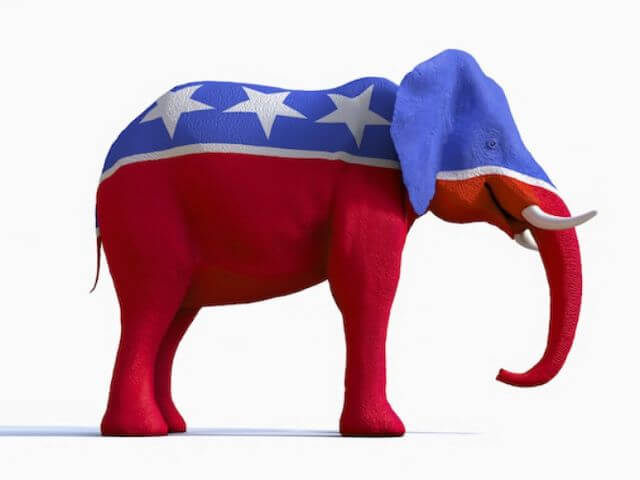1. Moderate Republican Lawmakers
Despite socially conservative religious groups rallying their supporters to elect them, some Republican lawmakers at the state and local levels describe themselves as fiscally conservative and socially liberal. In states like Wyoming, a Republican-dominated state, one analysis from Evidence-Based Wyoming found that around 31 state legislators considered themselves "very liberal," with all but two having the Republican label behind their name, placing 29 Republicans further to the left of several Democrat state lawmakers. Some of the reasons for many Republican state officials' moderate stances on issues like abortion, LGBTQ issues, school choice, and the Second Amendment include outside influence from different organizations or corporations, friendship with other Democrat lawmakers, cultural influences from celebrities, and more. Many of these lawmakers believe that by passing free-market conservative or libertarian economic policies and being moderate on social issues, they can appease both sides, despite being supported by conservative voters and organizations.
2. Lobbying Efforts by Outside Groups
Another significant reason Republican politicians in Red States do not pass more conservative legislation despite control of all houses and the governorship involves outside political lobbying groups and their campaign to influence lawmakers. In early January, the National Review found that the reason South Dakota, the third conservative state in America, did not pass a law that would protect women's support against men who identified as men was because of the Sanford Research Center, a left-wing healthcare organization, mobilizing behind the scenes to help kill the bill. Companies and corporations like Disney, Coca-Cola, and others have also threatened to pull out of Red States because of Democrat and progressive pressure, lobbying lawmakers to change their stance on conservative legislation. In response to the efforts by woke corporations and progressive lobbying groups to sway Republican lawmakers, conservative groups like the Idaho Freedom Caucus and the Arizona Freedom Caucus and other state-run conservative organizations have begun to act, putting pressure on state officials like Republican Governor Brad Little not to sign bills that will allow for student loan forgiveness programs and other Democrat policies. In Arizona, the Arizona Freedom Caucus has rallied supporters to stop Democrat Governor Katie Hobb's nominee for state health director over her stance on closing schools.
3. Bipartisan for the Sake of Bipartisanship
With the political division between Republicans and Democrats throughout the U.S., many moderate Republican lawmakers have echoed bipartisanship to create unity among both sides and end the current political climate. Yet many conservative lawmakers, pundits, and organizations have pointed out that when engaging in bipartisanship, Democrat and left-wing progressive lawmakers come away with their desired political policies, and Republicans compromise on conservative political values. In states like Texas, with a Republican supermajority, lawmakers have allowed Democrats to chair committees despite warnings that doing so would not benefit conservative legislation, allowing opponents to do everything to stifle or sway other lawmakers against it. In Utah, Republican Governor Spencer Cox vetoed a law banning men who identified as women as participants in women's sports receiving support from left-wing politicians and groups, prompting the Utah legislature to override his veto.
4. Lack of Pressure from Voting Constituents
In red and purple states, Republican lawmakers who do not vote for or advocate for social and economic conservative policies face no repercussions from their constituents. In many of these states, residents pay little attention to state-level politics, resulting in no accountability for Republican lawmakers when they fail to reflect the views of their constituents. Residents of red and purple states cannot name state representatives, relying instead on party name affiliation to decide whether or not they should get re-elected. Many moderate Republicans in red and purple states campaign on standing against radical left policies and being economically and socially conservative. However, when they are elected, they vote moderately, facing no accountability other than being re-elected or facing a primary. As a result, organizations like American Conservative Union and other conservative groups have begun preparing to launch advocacy campaigns and educate voters in Republican-controlled states about their state and local lawmakers, hoping to hold them accountable and pass policies that align with their voters.
5. Tight Majorities in Some State Legislatures
In states like Arizona, Virginia, and others, Republican state officials have a bare majority in either one or both houses and worry that by passing socially conservative policies and confronting cultural topics, they could lose the next election and be branded by their opponents and the national media as "radical." Additionally, while Republican lawmakers might have a majority, some lawmakers who consider themselves moderate can be persuaded by their Democrat colleagues or other outside interest groups to vote for Democrat policies, fracturing the majority and leading to Republican infighting. In early February this year, the Republican-led House of Delegates would not vote on proposals from GOP state delegates to ban abortion in Virginia, citing that Republican lawmakers do not see a path for the bill to become law, given the divided government and some Democrat lawmakers were going on the offensive against Republicans for their pro-life laws. For many lawmakers, having a tight majority means leading them to pick and choose the political fights in the legislature, prompting many to pursue conservative economic policies in the hopes that they can be re-elected and potentially expand their majority. While some conservative state legislatures have tried to gain traction for their policies on abortion and guns, conservative organizations and voters who favor such laws have directed their attention to school board races and federal offices, hoping to elect school board officials, senators, and house representatives who can implement conservative viewpoints in K-12 education and advocate for policies in Congress.
Related Story: Leftist Groups Tapping $1 Billion to Vastly Expand the Private Financing of Public Elections










